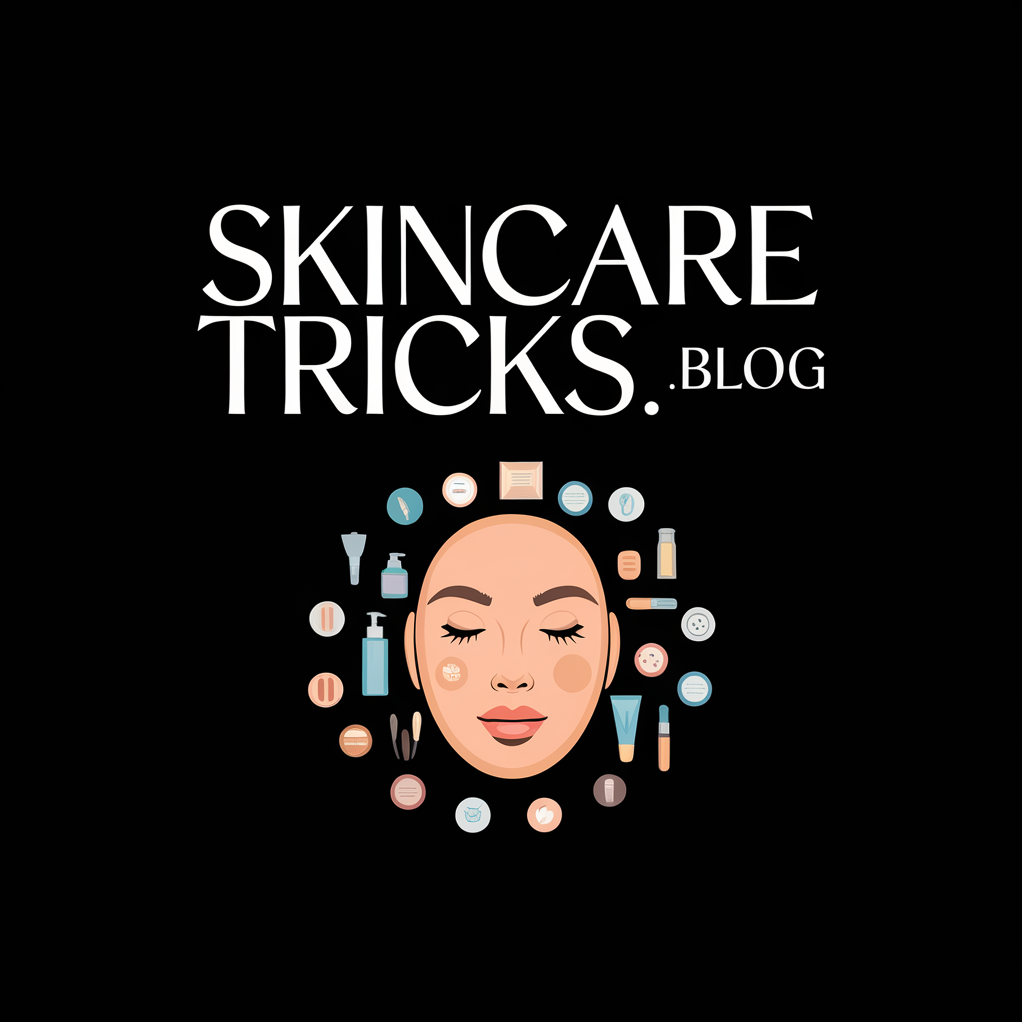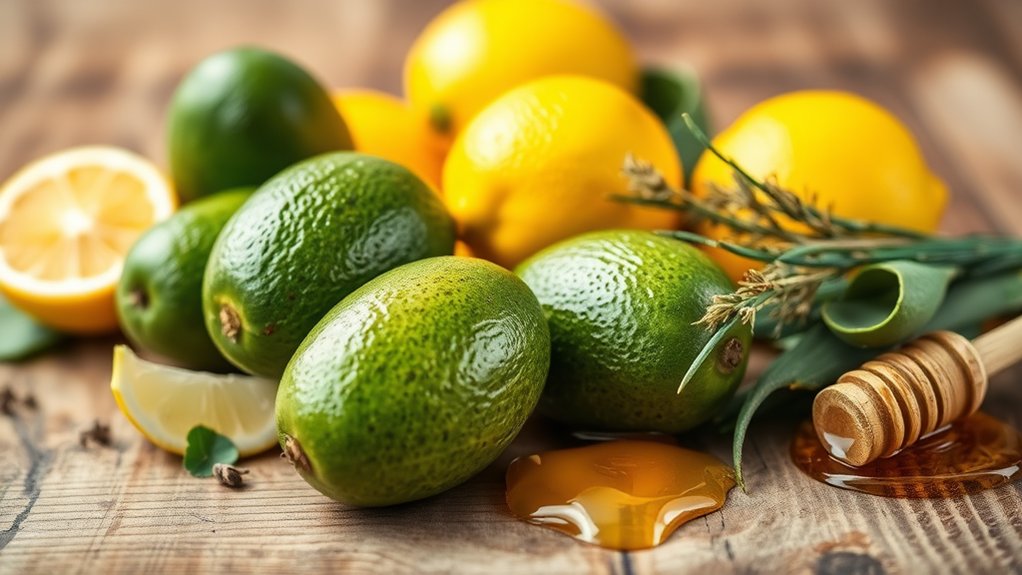10 Natural Ingredients That Fight Acne Fast
You might find it interesting that many effective acne treatments share common natural ingredients. These options harness properties like antibacterial action, anti-inflammatory effects, and moisture regulation to promote clearer skin. Knowing how these ingredients work can empower you to make informed choices for your skincare routine. Let’s explore ten potent natural remedies that can significantly improve your acne condition and enhance your overall skin health.
Tea Tree Oil
When it comes to combating acne, tea tree oil stands out due to its powerful antibacterial properties. Studies have shown that it effectively reduces acne-causing bacteria, making it a popular choice among natural acne remedies.
You can apply it topically by diluting a few drops with a carrier oil to ensure skin safety, as undiluted tea tree oil can irritate your skin. Regular use can lead to significant improvements in acne severity within weeks.
Additionally, its anti-inflammatory effects help reduce redness and swelling. Incorporating tea tree oil into your skincare routine can offer a natural, effective way to fight acne, and it is especially potent when used alongside other natural remedies in your regimen.
Witch Hazel
While you might be familiar with witch hazel as a soothing skin tonic, it also plays a significant role in acne treatment due to its astringent properties.
Witch hazel contains tannins that help reduce inflammation and tighten skin, minimizing pores and decreasing oil production. Studies indicate its effectiveness in reducing acne lesions, thanks to its ability to inhibit bacterial growth and soothe irritation. Including ingredients such as salicylic acid in your skincare routine can further enhance the effectiveness of witch hazel in combatting acne.
Honey
Honey, often hailed for its natural healing properties, serves as an effective remedy for acne due to its antibacterial and anti-inflammatory characteristics.
Research shows it can inhibit the growth of acne-causing bacteria, like Propionibacterium acnes. The natural sugars in honey help retain moisture, promoting skin healing without drying it out.
Its anti-inflammatory effects reduce redness and swelling, leading to a calmer complexion. For best results, apply raw honey directly onto affected areas and leave it on for 20-30 minutes before rinsing. Regular use can improve skin clarity and reduce breakouts, making honey a powerful ally in your skincare regimen. Additionally, incorporating honey into a diet low in high-glycemic foods can further support clearer skin.
Aloe Vera
Aloe vera is known for its healing properties, particularly in treating acne.
You can apply it directly to the skin or mix it with other natural remedies for enhanced effects.
Scientific research supports its anti-inflammatory and antimicrobial benefits, making it an effective option in your skincare routine. Additionally, its ability to soothe and hydrate makes it a valuable choice for maintaining clear skin.
Healing Properties of Aloe
When it comes to combating acne, aloe vera offers remarkable healing properties that can soothe irritated skin and promote healing. Its gel contains compounds rich in vitamins and antioxidants, which can aid in your skin’s recovery.
Benefits include:
- Anti-inflammatory properties that reduce redness and swelling
- Antimicrobial agents targeting acne-causing bacteria
- Hydrating effects improving skin moisture balance
- Wound healing abilities speeding up skin repair
- Rich nutrients like vitamins C and E, enhancing skin health
Application Methods Explained
Several effective methods exist for applying aloe vera to harness its acne-fighting properties.
You can use fresh aloe vera gel directly from the leaf by slicing it open and scooping out the gel. Apply it to affected areas twice daily.
Alternatively, you can purchase pure aloe vera gel from stores, ensuring it contains minimal additives. For spot treatment, use a cotton swab to apply the gel only on acne spots.
If you prefer a mask, mix aloe vera with honey and leave it on for 20 minutes before rinsing. Consistent application promotes healing and reduces inflammation effectively.
Scientific Research Insights
Studies have highlighted aloe vera’s potential in acne treatment, demonstrating its anti-inflammatory and antibacterial properties.
Research indicates that using aloe vera can promote clearer skin and reduce acne lesions effectively. Here are some key benefits:
- Reduction of redness due to its soothing properties
- Hydration of the skin without clogging pores
- Healing of acne scars over time
- Antimicrobial action that combats acne-causing bacteria
- Rich antioxidant content that promotes skin health
Incorporating aloe vera into your skincare routine could significantly improve your acne situation and enhance overall skin appearance.
Apple Cider Vinegar
Apple cider vinegar boasts strong antimicrobial properties that can help reduce acne-causing bacteria on your skin.
Its natural acidity also aids in balancing your skin’s pH, which is crucial for maintaining a healthy complexion. Additionally, its effectiveness is enhanced by its ability to fight dullness and improve overall skin tone, connecting users with a community of glowing skin enthusiasts.
Antimicrobial Properties Explained
The remarkable antimicrobial properties of apple cider vinegar make it a popular choice for combating acne. Its ability to inhibit the growth of bacteria helps clear your skin effectively.
When you apply it, you may find:
- Fewer blemishes appearing over time
- Reduced redness in existing acne
- Smoother skin texture as bacteria diminish
- Improved healing of irritated areas
- Enhanced clarity that boosts confidence
Studies suggest that acetic acid, the primary component, disrupts microbial membranes, making it difficult for acne-causing organisms to thrive.
Incorporating apple cider vinegar in your routine can lead to a clearer complexion without harsh chemicals.
Ph Balance Benefits
When you maintain a balanced pH level in your skin, you can significantly enhance its health and resilience against acne.
Apple cider vinegar (ACV) has an acidic pH, which can help restore your skin’s natural balance. Applying diluted ACV can create an unfavorable environment for acne-causing bacteria, reducing breakouts.
Additionally, its astringent properties can tighten pores and regulate oil production, preventing clogged pores. Studies show that an optimal pH level supports the skin’s barrier function, promoting hydration and reducing irritation.
Using ACV as a toner can hence be a quick, natural strategy to combat acne effectively.
Lemon Juice
Lemon juice, rich in citric acid and vitamin C, offers potent antibacterial and exfoliating properties that can significantly benefit those struggling with acne.
Its effectiveness stems from its ability to unclog pores and reduce inflammation. When you apply lemon juice, you’ll likely notice:
- A natural brightening effect on your skin
- Reduction in excess oil production
- A refreshing, invigorating aroma
- The sensation of coolness upon application
- A potential decrease in acne scarring over time
Always dilute lemon juice with water to avoid irritation, and test for sensitivity before regular use.
With consistent application, lemon juice can be a powerful ally in your acne-fighting regimen.
Green Tea
Green tea, laden with antioxidants and anti-inflammatory properties, is another natural remedy with significant potential for acne treatment.
Research shows that its active compound, epigallocatechin gallate (EGCG), reduces sebum production and inhibits the growth of acne-causing bacteria. By applying green tea extract or using it as a toner, you can help soothe inflamed skin and prevent new breakouts.
You can also drink green tea to benefit from its systemic effects. Regular consumption may enhance your skin’s overall health, combat oxidative stress, and promote healing.
With its multifaceted properties, green tea is a valuable ally in your acne-fighting regimen.
Jojoba Oil
Jojoba oil, a liquid wax extracted from the seeds of the jojoba plant, is renowned for its ability to mimic the skin’s natural oils. By using jojoba oil, you can potentially reduce acne and promote skin healing. It has anti-inflammatory properties and can help balance sebum production.
- Lightweight texture
- Deeply moisturizing without clogging pores
- Non-comedogenic, suitable for all skin types
- Rich in antioxidants and Vitamin E
- Soothes irritation and redness
Incorporating jojoba oil into your skincare routine may provide relief from acne and enhance overall skin health.
Verify its effects through personal trial.
Turmeric
Turmeric is known for its powerful anti-inflammatory properties, which can help reduce the redness and swelling associated with acne.
Its antibacterial effects target acne-causing bacteria, promoting clearer skin.
Additionally, turmeric’s skin brightening benefits can help diminish post-acne scars and improve overall complexion.
Anti-Inflammatory Properties
While inflammation is a key factor in the development of acne, using natural anti-inflammatory ingredients can significantly aid in managing this condition.
Turmeric, a well-known anti-inflammatory agent, contains curcumin, which helps reduce swelling and redness associated with acne. By incorporating turmeric into your skincare routine, you can enjoy its therapeutic benefits, such as:
- Minimizing skin irritation
- Soothing inflamed breakouts
- Reducing redness and hyperpigmentation
- Enhancing skin healing processes
- Promoting an even skin tone
Utilizing turmeric can empower you to fight acne effectively, promoting clearer and healthier skin through its powerful anti-inflammatory properties.
Antibacterial Effects
As you seek effective solutions for acne, consider the antibacterial properties of turmeric, which can play a crucial role in combating acne-causing bacteria. Curcumin, the active compound in turmeric, exhibits significant antibacterial effects, making it a valuable addition to your skincare routine. Below is a summary of its antibacterial actions:
| Property | Effect on Acne | Evidence |
|---|---|---|
| Antibacterial | Kills bacteria | Journal of Clinical Microbiology |
| Anti-inflammatory | Reduces redness | Phytotherapy Research |
| Antioxidant | Protects skin | Food Chemistry |
| Wound healing | Accelerates healing | BMC Complementary Medicine |
Incorporate turmeric for a clearer complexion!
Skin Brightening Benefits
The vibrant hue of turmeric isn’t just for culinary delights; it offers significant skin brightening benefits that can enhance your complexion.
Its active compound, curcumin, is known for its anti-inflammatory and antioxidant properties, leading to a radiant look.
Consider incorporating turmeric into your skincare routine for:
- Reduced dark spots and hyperpigmentation
- Improved skin tone consistency
- Enhanced overall luminosity
- Soothed irritation from acne scars
- A natural glow without harsh chemicals
These benefits stem from turmeric’s ability to promote cell regeneration and inhibit melanin production, resulting in brighter, healthier skin.
Oatmeal
Oatmeal offers a natural solution for managing acne due to its anti-inflammatory and soothing properties. It contains saponins, which help cleanse your skin by removing excess oil and unclogging pores.
Moreover, oatmeal is rich in antioxidants, aiding in the reduction of skin irritation and redness. When applied topically, it forms a protective barrier, preventing moisture loss and promoting healing.
Studies show that colloidal oatmeal can improve skin hydration and overall appearance. You can create a simple face mask by mixing oatmeal with water or honey for enhanced benefits.
Incorporating oatmeal into your skincare routine could help combat acne effectively.

